
|
Astronomy Picture Of the Day (APOD)
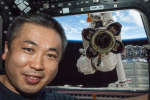 Space Station Robot Forgets Key Again
Space Station Robot Forgets Key Again
1.04.2014
Space station robot AFJ013 has forgotten her space lock key again. The frustrated robot was reduced to tapping on a space station window and asking for a human to let her back in -- for the third time this week.
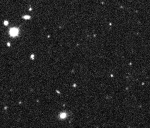 2012 VP113: A New Furthest Known Object in Solar System
2012 VP113: A New Furthest Known Object in Solar System
31.03.2014
What is the furthest known object in our Solar System? The new answer is 2012 VP113, an object currently over twice the distance of Pluto from the Sun. Pictured above is a series...
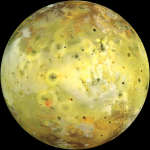 Io in True Color
Io in True Color
30.03.2014
The strangest moon in the Solar System is bright yellow. This picture, an attempt to show how Io would appear in the "true colors" perceptible to the average human eye, was taken in 1999 July by the Galileo spacecraft that orbited Jupiter from 1995 to 2003.
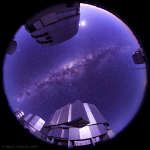 A Milky Way Dawn
A Milky Way Dawn
29.03.2014
As dawn broke on March 27, the center of the Milky Way Galaxy stood almost directly above the European Southern Observatory's Paranal Observatory. In the dry, clear sky of Chile's Atacama desert...
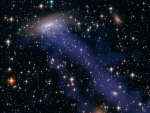 Stripping ESO 137 001
Stripping ESO 137 001
28.03.2014
Spiral galaxy ESO 137-001 hurtles through massive galaxy cluster Abell 3627 some 220 million light years away. The distant galaxy is seen in this colorful Hubble/Chandra composite image through a foreground of the Milky Way's stars toward the southern constellation Triangulum Australe.
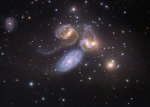 Stephan s Quintet Plus One
Stephan s Quintet Plus One
27.03.2014
The first identified compact galaxy group, Stephan's Quintet is featured in this remarkable image constructed with data drawn from Hubble Legacy Archive and the Subaru Telescope on the summit of Mauna Kea.
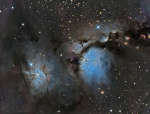 M78 and Reflecting Dust Clouds
M78 and Reflecting Dust Clouds
26.03.2014
An eerie blue glow and ominous columns of dark dust highlight M78 and other bright reflection nebula in the constellation of Orion. The dark filamentary dust not only absorbs light, but also reflects the light of several bright blue stars that formed recently in the nebula.
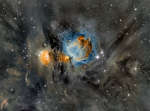 Orion Nebula in Surrounding Dust
Orion Nebula in Surrounding Dust
25.03.2014
What surrounds a hotbed of star formation? In the case of the Orion Nebula -- dust. The entire Orion field, located about 1600 light years away, is inundated with intricate and picturesque filaments of dust.
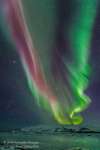 Orion and Aurora over Iceland
Orion and Aurora over Iceland
24.03.2014
If you see a sky like this -- photograph it. A month ago in Iceland, an adventurous photographer (pictured) chanced across a sky full of aurora and did just that. In the foreground lies the stratovolcano жrФfajЖkull. In the background, among other sky delights, lies the constellation of Orion, visible to the aurora's left.
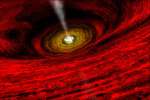 The View Near a Black Hole
The View Near a Black Hole
23.03.2014
In the center of a swirling whirlpool of hot gas is likely a beast that has never been seen directly: a black hole. Studies of the bright light emitted by the swirling gas frequently indicate not only that a black hole is present, but also likely attributes.
|
January February March April May June July August September October November December |
|||||||||||||||||||||||||||||||||||||||||||||||||